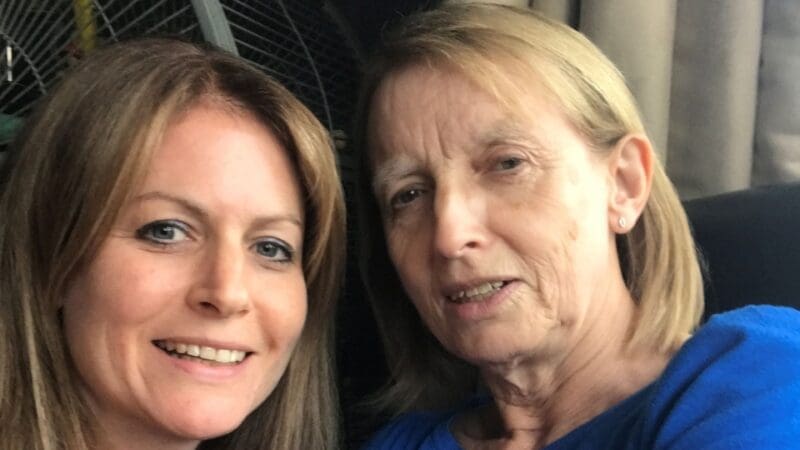
“Our Admiral Nurse initiated a conversation about end of life”
As a palliative care nurse, Jenny reflects on the importance of empathy during end of life care and how her Admiral Nurse helped her family prepare for her Mum's death.

Jenny reflects on the importance of having difficult conversations around end of life care.
Mum was a very gentle and empathic person. Family was very important to her. She was a nurse for most of her career and always looked after her own health. I followed in her footsteps and became a nurse, later specialising in palliative care.
Mum was shy and sometimes lacked confidence. But over the course of her life, she really came out of her shell. Later in life, Mum loved singing and was part of a choir. She used to hide at the back, but I encouraged her to move to the front and sing out.
Mum had anxiety, and I put a lot of her early symptoms of dementia down to this. The signs were fairly subtle to begin with, like struggling to get her words out. But then she had a car accident and drove into the side of her house, and we knew that there was something else going on.
Mum was diagnosed with frontotemporal and vascular dementia in 2019 when she was only 69. My dad cared for her at home until the end of her life, and I also helped, along with my brother and aunt, which gave him a well-needed break.
As Mum’s dementia progressed, I reduced my nursing hours and eventually stopped seeing patients, returning to an educational role, so that I could invest as much energy as I could into caring for her. Even though Mum relied on a wheelchair, I wanted her to have the best possible quality of life. We went on spa days; when her dementia got worse, we still visited garden centres and went for afternoon teas, until she became restricted to bed rest.
Dementia ultimately took over and I started to lose sight of who Mum was before the diagnosis. I knew she was losing the capacity to make decisions, and that we needed to get a ReSPECT (Recommended Summary Plan for Emergency Care and Treatment) form in place to record her preferences for her care before it was too late.
Despite being a palliative care nurse, I still found it difficult to have certain conversations around Mum’s care. I knew she didn’t want to be resuscitated or have artificial feeding tubes, but I had to initiate that conversation with a healthcare professional to make sure her preferences were recorded before she lost mental capacity. I would have felt much more comfortable if someone had brought it up with me earlier.
Mum eventually lost the ability to communicate, but I found other ways to connect with her like playing her music from her choir group. I would sing to her and encourage her to sing back. Music is a great tool for people living with dementia.
I knew Dad needed outside support, but he had a ‘stiff upper lip’ attitude which created a barrier to accepting any help. But as it turned out, Anne, the dementia specialist Admiral Nurse who we were referred to had been Mum’s community psychiatric nurse in the past. This made Dad feel much more comfortable as he was already familiar with her. She would visit him and Mum at home; she made Dad feel at ease and he was able to open up to her about how he was feeling.
Anne initiated a conversation with Dad about Mum’s end of life care. I’d had similar conversations with him, but he seemed to accept it more easily coming from an Admiral Nurse. She helped Dad to prepare for Mum’s death by talking openly about it and left some leaflets for him to read and reflect on in his own time. Whilst it was difficult to have these conversations, it was important that my family were prepared.
At the end of her life, palliative care nurses visited Mum at home. She was in a lot of pain, which was extremely difficult to watch. One nurse acknowledged how hard it is when your loved one is dying and in pain when you are a palliative care nurse by profession. She had a lot of empathy and really listened to my concerns about Mum’s pain management. As a result, Mum died peacefully, and eventually without pain. That will always stay with me.
Anne was there for us as a family after Mum died. She continued to visit Dad at home and supported him through his bereavement. She even attended Mum’s funeral, which I know was comforting for Dad.
Despite my background as a palliative care nurse, I didn’t reach out to the Admiral Nurses until the last few months of Mum’s life. That is a regret, but none of the healthcare professionals we had contact with ever mentioned them to us. I wish we’d had an Admiral Nurse involved throughout the whole dementia journey. Dad needed continuity and one person to coordinate and advise on Mum’s care.
I’m passionate about spreading the word about Admiral Nurses, and recently arranged for an Admiral Nurse to talk to healthcare professionals at the hospice where I work about the support they offer to families living with dementia. I will continue to do what I can to raise awareness of Admiral Nurses as I’m so grateful for the support we received.

As a palliative care nurse, Jenny reflects on the importance of empathy during end of life care and how her Admiral Nurse helped her family prepare for her Mum's death.

When Rosie’s mum, Dawnie, was diagnosed with young onset Alzheimer’s disease, her employer ensured caring responsibilities were fully supported.

Phil highlights the difference it makes when someone living with dementia receives appropriate support in the workplace. He urges employers not to "write someone off" because of their diagnosis.